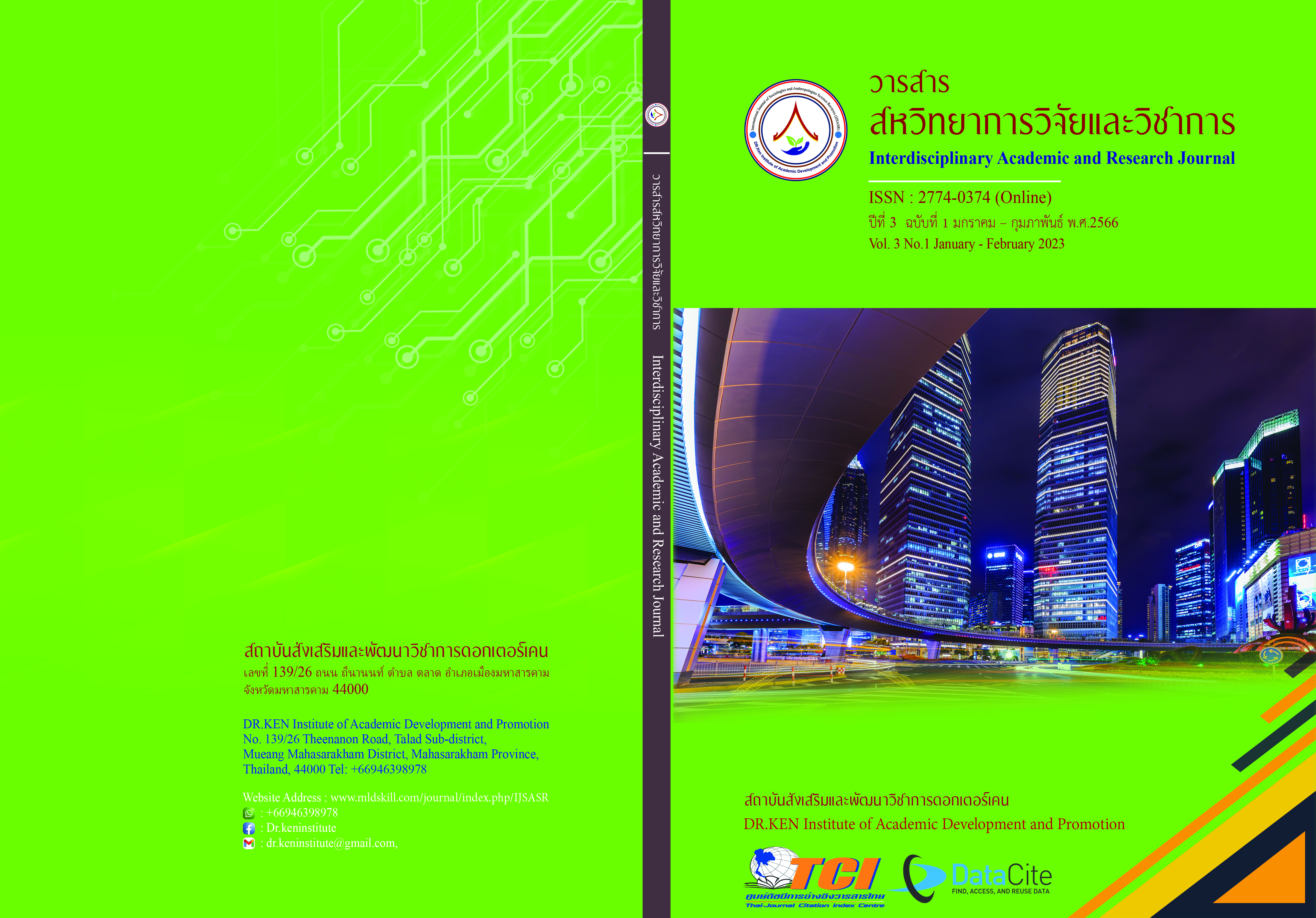Factors Influencing Household Waste Management in Yod Kang Subdistrict Na Mon District Kalasin Province
DOI:
https://doi.org/10.14456/iarj.2023.18Keywords:
Influencing Factors; , Waste Management; , HouseholdAbstract
The amount of solid waste is increasing all the time due to the rapid expansion of the development of more technology to facilitate the comfort and living of dense urban areas, especially in developing countries. This research study has the objectives; (1) To study the level of household waste management. (2) Analyze the factors influencing household waste management. And (3) study suggestions on factors influencing household waste management. This study was conducted in the Yod Kang sub-district, Namon district, Kalasin province, which was quantitative research. The sample consisted of 382 eligible voters. The data collection tools were statistical questionnaires used to analyze the data: percentage, mean, frequency, standard deviation, and linear regression multiple analysis. The results showed that (1) The overall level of household waste management is at a high level. (2) Factors influencing household waste management, such as promotion from local government organizations, self-responsibility awareness, and household members' participation, can be predicted at 57.70 percent with significant Statistics at level .05. And 3) suggestions on factors influencing household waste management, namely; community leaders should have public relations campaigns for people in the community to sort waste types before disposing of. The local government should publicize the public to know how to dispose of waste such as branches, leaves, and grass to reduce the burden of collection. The clothing and shoes should be repaired initially, and people should know how to collect recyclable waste to sell to generate income.
References
กนกอร บุญมี, ธวัช ทะเพชร และนภารัตน์ พุฒนาค. (2560). แนวทางการจัดการขยะโดยการมีส่วนร่วมของชุมชนบ้านเป็ด อำเภอเมือง จังหวัดขอนแก่น. วารสารสถาบันวิจัยพิมลธรรม, 4(2), 85-98.
กองส่งเสริมความรอบรู้และสื่อสารสุขภาพ กรมอนามัย กระทรวงสาธารณสุข. (2561). การคัดแยกขยะเริ่มต้นได้ที่ตัวคุณ. Retrieved from: https://multimedia.anamai.moph.go.th/help-knowledgs/waste-management/.
จตุพร ไกรกิจราษฎร์ และโชติ บดีรัฐ. (2565). ปัจจัยที่ส่งผลต่อการคัดแยกขยะมูลฝอยในเขตพื้นที่ตำบลไกรนอก อำเภอกงไกรลาศ จังหวัดสุโขทัย. Journal of Roi Kaensarn Academi, 7(7), 276–277.
มะลิวัลย์ สีหะวงษ์. (2559). การมีส่วนร่วมของประชาชนต่อการจัดการขยะมูลฝอยในเขตองค์การบริหารส่วนตำบลท้ายดง อำเภอวังโป่ ง จังหวัดเพชรบูรณ์. วิทยานิพนธ์ปริญญารัฐประศาสน ศาสตรมหาบัณฑิต: มหาราชภัฏเพชรบูรณ์.
รังสรรค์ สิงหเลิศ. (2551). ระเบียบวิจัยทางสังคมศาสตร์ มหาสารคาม. มหาสารคาม: โรงพิมพ์มหาวิทยาลัยราชภัฏมหาสารคาม.
สำนักงานคณะกรรมการพัฒนาการเศรษฐกิจและสังคมแห่งชาติ. (2560). แผนพัฒนาเศรษฐกิจและสังคมแห่งชาติ ฉบับที่ 12พ.ศ.2560-2564. กรุงเทพ : สำนักงานคณะกรรมการพัฒนาการเศรษฐกิจและสังคมแห่งชาติ สำนักนายกรัฐมนตรี.
สุริยะ หาญพิชัย. (2561). การพัฒนาผลสัมฤทธิ์ทางการเรียนโดยใช้การเรียนรู้ด้วยกระบวนการกลุ่มในรายวิชาสถานการณ์โลกปัจจุบัน. วารสารลวะศรี มหาวิทยาลัยราชภัฏเทพสตรี. 4 (1), 15-26.
หฤทัย อาจปรุ. (2554). ความสัมพันธ์ระหว่างปัจจัยส่วนบุคคล ภาวะผู้นำ รูปแบบการดำเนินชีวิต และความสามารถในการเรียนรู้ ด้วยตนเองกับการมีจิตสำนึกสาธารณะของนักศึกษาพยาบาลเขตกรุงเทพฯ. วิทยานิพนธ์ปริญญาวิทยานิพนธ์พยาบาล ศาสตรมหาบัณฑิต. กรุงเทพฯ: จุฬาลงกรณ์มหาวิทยาลัย.
องค์การบริหารส่วนตำบลยอดแกง. (2564). บริบททั่วไปองค์การบริหารส่วนตำบลยอดแกง. กาฬสินธุ์: องค์การบริหารส่วนตำบลยอดแกง.
Yamane, T., (1973). Statistics: An Introductory Analysis. (3rded). New York: Harper and Row Publications.
Downloads
Published
How to Cite
Issue
Section
License
Copyright (c) 2023 Chalermpol Sriwiboon, Sanya Kenaphoom, Saovalak Kosonkittiumporn

This work is licensed under a Creative Commons Attribution-NonCommercial-NoDerivatives 4.0 International License.
Copyright on any article in the Interdisciplinary Academic and Research Journal is retained by the author(s) under the under the Creative Commons Attribution-NonCommercial-NoDerivatives 4.0 International License. Permission to use text, content, images, etc. of publication. Any user to read, download, copy, distribute, print, search, or link to the full texts of articles, crawl them for indexing, pass them as data to software, or use them for any other lawful purpose. But do not use it for commercial use or with the intent to benefit any business.
















.png)


